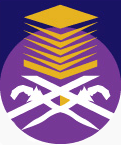UiTM Faculty of Civil Engineering
|
Seal of Universiti Teknologi MARA | |
| Type | Public |
|---|---|
| Established | 1967 |
| Dean | Professor Dr. Azmi Ibrahim |
| Students | 1691 |
| Location |
Shah Alam, Selangor, Malaysia 3°04′17″N 101°29′46″E / 3.071438°N 101.496168°E |
| Campus | Urban |
| Tagline | We create the future |
| Affiliations | Universiti Teknologi MARA Malaysia |
| Website | |
UiTM Faculty of Civil Engineering is one of the professional graduate faculty of UiTM located in Shah Alam, Malaysia.
The Dean in office is Professor Dr. Azmi Ibrahim, who assumed the role in 2010. Currently, the faculty consists of 89 academic staff, 24 admin and 40 technical staff. It has about 501 postgraduate students and 1190 undergraduate.
Historical Background
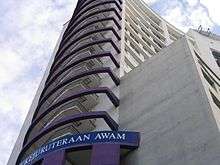
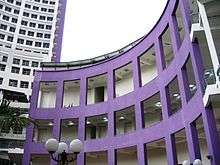
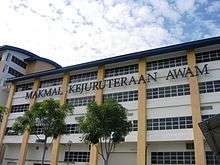
The Faculty of Civil Engineering for Universiti Teknologi MARA Malaysia was established in 1967. It started by providing courses in Civil Engineering at the Diploma level for Institiut Teknologi MARA. Students who have completed the Diploma were given options to continue their studies to obtain a Higher National Diploma. When ITM is granted a full university status, all diplomas issued by ITM have been upgraded to an undergraduate degree. The faculty starts offering undergraduate and post-graduate courses in (year). Click here to know more
Centre of Studies
Structural and Material Engineering Division(STRUCM)
The latest evolution of Faculty of Civil Engineering is the formation of the Division of Structures and Materials in July 2009. Adapting to the rapid changes and specialization of programs in Civil Engineering, the two original divisions; Division of Structures and Computing and Division of Construction Engineering and Project Management have split to form and rebrand the divisions into Division of Structures and Materials and Division of Construction Business and Project Management. The formation of the Division of Structures and Materials now has a very clear focus on structural engineering and construction materials. To keep abreast with the need of construction industries, Division of Structures and Materials (StrucM) has providing foundation and advance courses on the construction materials, material design and analysis, structure analysis, structural design and in the modeling and analysis tools employed for the numerical quantification and visualization of structural response etc. The subjects taught contribute to the formation of the fundamentals of the calculation (analysis and design) of the building structures and new knowledge on advanced materials which offering helpful tools for engineers. Civil engineering stresses that studies should be closely combined with engineering practice therefore site visits and talks by practitioners has been incorporated in the curriculum and encouraged if not stated. Full details of the courses offered can be found in the academic guideline book published by the faculty.
For advance materials development, structural design and analysis, the adoption of new materials, new structures and new technologies and the application of information technologies for construction engineering have become the major features in the development of the curriculum for postgraduate programme.
Besides high quality teaching and instruction at both undergraduate and postgraduate levels, the Division is actively involved in basic and applied research and consultancy and provides high quality technical advisory support through various R&D projects and consultancy to various organizations. The Division of Structures and Materials continues to maintain and cultivate its strong links with the infrastructural industry and academic and research institutions both within and outside the country.
Water Resources and Environmental System Division(WRES)
In line with the emphasis placed by the country in developing and managing the water resources sustainably and caring for the environment, the Division of Water Resources and Environmental Systems (WRES) of the Civil Engineering Faculty, Universiti Teknologi MARA has assumed significant role and responsibility since its establishment. The instruction and research by this division address the development and application of the mathematical concepts, scientific principles, economic theories and impact assessments to the management and planning of water resources and environmental systems.
The division has put concerted efforts in developing new knowledge in the frontier of science through active participation and partnering in researches, intra and inter-disciplinary, locally and abroad. In the future the division hopes to hopes to have research collaboration with new partners. A mutual agreement with future partners will foresee a more outstanding and excellent contribution to the field of water resources and environmental engineering. At present, the faculty members in this division have been very active in conducting funded research projects from several research grants agencies including MOSTI (e-science fund), MOHE (FRGS), UiTM Internal Fund, CIDB, NAHRIM and the local industries. The achievement and recognition received by the leading experts of the division have greatly marked the division’s achievement in the international arena. Currently, the division is supported by 34 faculty members in various field of expertise headed by Dr. Marfiah Ab. Wahid. Their undivided commitment and serious effort in pursuing a remarkable level of achievement will promise an outstanding future in academic excellence.
The laboratories under the division of Water Resources and Environmental Systems are Hydrology, Environmental (1) and (II), Environmental (Research), Fluid Mechanic, and Hydraulic Laboratories. All laboratories are fully equipped with advanced teaching and research equipment. These include a wave basin, open channel flumes, water hammer and surge tank, rainfall simulators, hydrology apparatus, model sedimentation apparatus, pneumatic membrane casting, ion and gas chromatograph, autoclave, shaker bath, fume bath, and water quality apparatus and equipment.
The software available to carry out numerical modeling and simulation studies includes ARC-GIS, Infoworks River Simulation (RS), Water Supply (WS) and Collection System (CS).
The division is responsible towards teaching undergraduate courses such as Fluid Mechanics, Hydraulics, Hydrology, Water Supply, Wastewater Engineering, Groundwater, Hydraulics Structures, and Coastal Engineering. Inputs from the panel of advisors and industries are strongly referred to, in the development of the undergraduate and postgraduate programs. Ideas from public policy and law, social sciences and humanities are often employed in conjunction with the engineering principles and the practical aspects, to develop a better understanding of the role of engineering in the solution of water and environmental problems. Among the courses offered in the master's degree program are Environmental Management, Water Resources Planning and Management, Flood Management and Mitigation, Advanced Water Supply, Solid Waste Management, Erosion and Sedimentation, Groundwater Engineering, Computational Fluid Dynamic, Hazadous and Industrial Waste, Risk and Hazard Assessment, Environmental Management of Coastal Areas, and Air Pollution.
Research projects undertaken by the researchers of the division include anoxic process in sewer, anoxic and anaerobic process of leacheate treatment, biodegradation of polycylic aromatic hydrocarbons (PAHs), bioadsorption of heavy metal using fungi, membrane technology, river sediment modeling, flood modeling and simulation, hydro-meteorological flood forecasting, remote sensing techniques using radar and geostationary meteorological satellite in quantitative precipitation forecast, intelligent flood warning system and inundation model, river pollution, groundwater contaminant modeling and remediation optimization, statistical analysis of hydrologic processes, water supply systems management, non-revenue water analysis, water quality planning, risk analysis, river basin management, systems planning and operation, ecological systems management, sustainable development, and computer graphics-oriented decision support systems.
The Flood-Marine Excellence Centre has been established by Prof. Ir. Dr. Junaidah Ariffin. Members of the centre includes Assoc. Prof. Dr. Wardah Tahir, Dr Mohd Fozi Ali and from different disciplines such as Assoc. Prof. Dr. Azlinah Mohamed and Assoc. Prof. Zaidah Ibrahim. The aim of establishing this centre is to promote research in the field of hydrology, hydraulics and coastal engineering. The members affiliated to this research centre had secured grants worth a million Malaysian ringgit of which six (6) research are still on-going. The research areas include water resources development, evaluation techniques of channel stability and erosion control, local bed changes of restoration areas, channel distributaries, hydraulic structures such as sills, small dams, weirs and water intakes, flood forecasting, evacuation scenarios, flood hazard reduction and flood protection, the application of numerical methods in water resources and sedimentation, flood analysis, prediction, forecasting and warning, risk and management. The other activities of the centre are organising workshop, seminar, training and conference in promoting knowledge in the area. The centre is aggressively pursuing opportunities to work with other institutions, public and private sectors (both local and abroad) on issues related to flood analysis, management and coastal engineering. This centre has published more than 250 publications including 65 in refereed journals. Currently, there are ten (10) students pursuing their postgraduate degree by research working under the supervision of this centre.
Geotechnical Highway Engineering Division(GEOTREN)
GeoTrEn spearheads two important areas in civil engineering; namely; geotechnical engineering, and transportation engineering. For bachelor's degree programmes, there are seven (7) courses offered as well as courses from other centers, such as Engineering Geology, Engineering Survey, Geotechnical Laboratory, Soil Mechanics, Geotechniques, GIS for Engineers, Highway and Traffic Engineering. There are four (4) courses offered as an elective course, namely Foundation Engineering, Geotechnical Engineering, Urban Traffic Management and Pavement Engineering. These courses are designed to provide good engineering practice to young graduates in the related fields.
In addition, two master's degree programmes (by coursework) are offered under this center, which are M.Sc in Geotechiques and M.Sc in Highway Engineering, emphasize given to the specialized courses in the respective field. Besides, postgraduate research programmes (M.Sc and PhD) are also offered in specific areas such as advanced saturated and unsaturated soil mechanics, numerical modeling, soil stabilization, tropical rock engineering, site investigation and geophysics. While for transportation engineering the interest fields include pavement engineering, traffic, road safety engineering and urban transportation.
Based on the expertise of the lecturers at the center, three research centers have been established under the Institute for Infrastructures Engineering and Sustainable Management (IIESM) namely myGERMeG, GeoFORENSIC and TRANSIT. Under myGERMeG research center, the members are actively involved in research, consultation and act as expert advisory group addressing geotechnical design and development in the areas of tropical rock engineering, soil and rock testing, and soft soil stabilization. Meanwhile, members of GeoFORENSIC research center address geotechnical problems related to tropical climate, especially on residual soil and soft marine clays i.e. landslide, soil erosion, ground settlement of highways and construction embankments on marine clay, karstic limestone and sinkholes, collapse of excavation during deep constructions and tunneling. TRANSIT research center focuses on transportation systems, infrastructure and intelligent transport which involve planning, design, construction, maintenance, and operation of transportation facilities and infrastructure.
As one of the center of studies in the Faculty of Civil Engineering UiTM, it is equipped with the best laboratory facilities and latest equipment/software for the purpose of teaching and learning, research, consultancy and staff/student development.
Construction Business and Project Management Division(CBPM)
Construction is a combination of organizations engineering science, studied guesses and calculated risks. From their very nature, construction operations techniques must be performed at the site of the project. Construction is a dynamic, restless, compelling business. The ongoing construction work, plants and machinery involved, engineers and workers are part of its concerned.
To be a global research, training and consultant organization in the field of Construction Business and Project Management.
- To prepare engineering graduates for management positions in construction companies and projects.
- To provide creative and innovative solutions for construction companies and projects.
- To provide state of the art technology and know how for managing sustainable construction projects.
- To structure training programs within and beyond the engineering curriculum dedicated towards the development of construction business and project management knowledge and skills.
- To initiate and conduct research activities in collaboration with the industry.
- To provide training and consultancy services for the industry.
- To create a pool of expertise locally and globally in the field of construction business and project management.
- To provide a platform for sharing of ideas and information with regards to construction business and project management.
- To provide facilities and infrastructure within and outside the faculty that would support the above objectives.
- To develop expertise within the department for the purpose of achieving the above objectives.
- To create linkages with the major players in the construction industry.
Programmes
Programme Educational Objective (PEO) FCE UiTM 2009
| PEO DIPLOMA | PEO - B.Eng (Hons.)Civil | PO - MSc. Civil Engineering |
|---|---|---|
| Have a sound understanding of as well as the ability to apply fundamental principles of engineering knowledge. | Have a sound understanding of, as well as the ability to apply fundamental principles of engineering knowledge and are capable of expanding this knowledge through engineering and scientific research. | Having the ability to apply the advanced concepts in design related to specialized field in civil engineering. |
| Practice with strong ethics and understand the impacts of engineering projects on the environment. | Practice with strong professional ethics and understand the impacts of engineering projects on the environment, society, politics and the well being of local and regional economy. | Having the ability to lead and coordinate multi-disciplinary teams. |
| Are able to communicate effectively with members of the profession and the society in general on engineering and non-engineering subjects. | Are able to communicate effectively with members of the profession and the society in general on engineering and non-engineering subjects. | Practice with professional ethics. |
| Have the competency to contribute as a team member of a multi-disciplinary team. | Have the competency to contribute as a team member of a multi-disciplinary team or assume the role of a team leader in projects undertaken within or beyond the national boundaries. | |
| Have the ability to adapt to changes in economic climate through awareness on contemporary issues, entrepreneurship and lifelong learning skills. | Have the ability to adapt to changes in economic climate through awareness on contemporary issues, entrepreneurship and lifelong learning skills. | |
Programme Outcomes (PO) FCE UiTM 2009
| PO-DIPLOMA | PO - B. Eng (Hons.) Civil | PO - MSc Civil Engineering |
|---|---|---|
| Ability to acquire and apply basic knowledge of science, mathematics and engineering | Ability to acquire and apply basic knowledge of science, mathematics and engineering. | Ability to think critically and apply the advanced knowledge of mathematics, science engineering and technology. |
| Ability to communicate effectively with technical personnel and public | Ability to communicate effectively, not only with engineers but also with the public. | Ability to solve engineering problems through independent research and effectively communicate the results to multi-disciplinary teams. |
| Ability to identify, formulate and solve engineering problems | Ability to identify, formulate and solve engineering problems. | Ability to integrate and synthesize knowledge and manage complex problems through teamwork. |
| Ability to function in multi-disciplinary teams | Ability to use a system approach to design and evaluate operational performances. | Ability to expand the acquired knowledge through research with autonomy. |
| Ability to act effectively as an individual and in a group with leadership, managerial and entrepreneurial capabilities | Ability to act effectively as an individual and in a group, with leadership, entrepreneurial and managerial capabilities. | Ability to evaluate and make ethical decisions within constraints while considering impacts on societies, environment and sustainable development. |
| Understanding of the social, cultural, global and environment responsibilities, and ethics for sustainable development | Understanding of the social, cultural, global and environmental responsibilities and ethics of a professional engineer and the need for sustainable development. | |
| Recognizing the need to undertake lifelong learning and possessing / acquiring the capacity to do so | Recognizing the need to undertake lifelong learning and possessing/acquiring the capacity to do so. | |
| Ability to design and conduct experiments, as well as to analyse and interpret data | ||
| Ability to function on multi-disciplinary teams | ||
| Having technical competency and ability to apply to specific Civil Engineering discipline. | ||
| Having the knowledge of contemporary issues | ||
| Ability to demonstrate and apply knowledge and understanding of project management principles, finance and entrepreneurship |
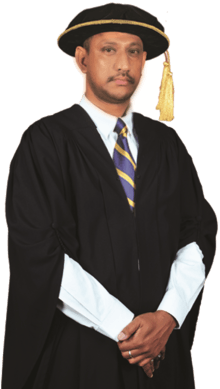
Programmes Offered
- Diploma
- Bachelor's Degree in Civil Engineering
- Master by Coursework
- Master by Research
- Doctor of Philosophy in Civil Engineering
Campuses
- Campus Selangor - Shah Alam - main campus - postgraduate and undergraduate
- Campus Pulau Pinang - Permatang Pauh - undergraduate
- Campus Pahang - Jengka- undergraduate
- Campus Sarawak - Kota Samarahan - undergraduate
- Campus Johor - Pasir Gudang - undergraduate
Dean
For more than 50 years, UiTM have been growing in tandem with the development of our country, shouldering the responsibility of educating the younger generations who are the leaders of tomorrow. Today, UiTM is recognized as a well-established Institution of Higher Learning with outstanding Faculties and Programmes. Despite all of these achievements, there are more achievements to be accomplished and challenges to be overcome especially for the Faculty of Civil Engineering (FCE).
Indeed, the discipline of civil engineering is frequently touted as the backbone of the physical development of a nation. In FCE, it is always a great joy to know that our graduates are builders of the nation. However, behind the pride lies the immense responsibility of doing our parts well in producing graduates who are employable and ready to serve in shaping our skyline. Our VC Y.Bhg Dato’ Ir. Dr. Sahol Hamid Abu Bakar has always stressed on strengthening our academic excellence through sustainable strategic leadership. As the Dean of the faculty, I strive to lead the faculty in the right direction in line with the vision and mission of UiTM and am always open to constructive ideas in order to make FCE a first choice for teaching and learning.
Former Dean
- Dato' Hashim Salleh - Head of School Engineering - 11 March 1968 - 31 December 1972
- Ir. Toh Weng Fook - Head of School Engineering - 1 January 1973 - 30 June 1976
- Syed Abdul Kadir Al-Junid - Head of School Engineering - 1 July 1976 - 30 September 1979
- Dr. Mohd Nawi Salleh - Head of School Engineering - 1 October 1979 - 14 March 1983
- Dato Hj. Mohamed Dahalan Mohamed Ramli - Head of School Engineering - 15 March 1983 - 1 April 1984
- Abdullah Suhaimi Mohamed - Head of School Engineering - 1 May 1984 - 30 April 1988
- Prof. Ir. Haron Ismail - Head of School Engineering - 1 May 1988 - 31 July 1991
- Dr. Hasan Ibrahim - Head of School Engineering - 1 August 1991 - 31 July 1993
- Sr. Mohd Khalid Mohd Omar - Head of School Engineering - 1 August 1993 - 31 July 1995
- Dato' Prof Madya Ir. Hj. Mohd Salleh Mohd Noh - Dean - 1 August 1996 - 14 January 2002
- Tan Sri Dato' Sri Professor Ir. Dr. Hj. Sahol Hamid Abu Bakar - Dean - 15 January 2002 - 16 August 2002
- Prof. Ir. Dr. Hj. Mohd Yusof Abdul Rahman - Dean - 23 August 2002 - 31 May 2006
- Prof. Ir. Dr. Hjh. Zainab Mohamed - Dean - 1 June 2006 - 30 September 2010
Alumni
Since its establishment in 1967, the Faculty of Civil Engineering has graduated more than 20,000 graduates. More details can be obtained from our official website.
